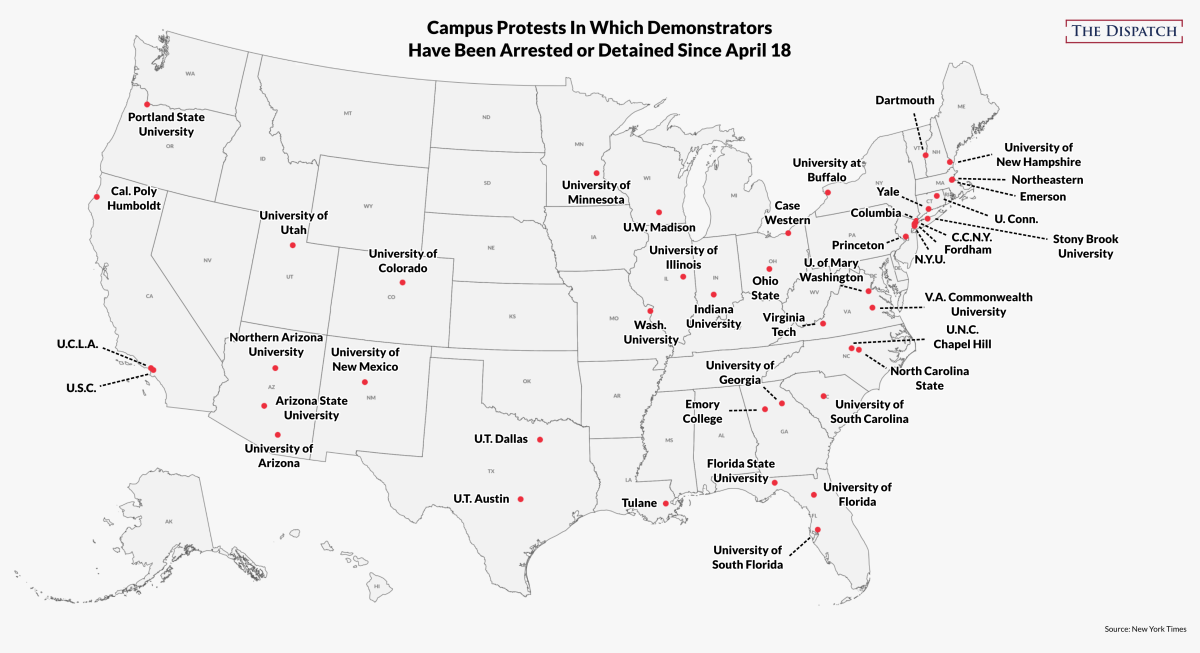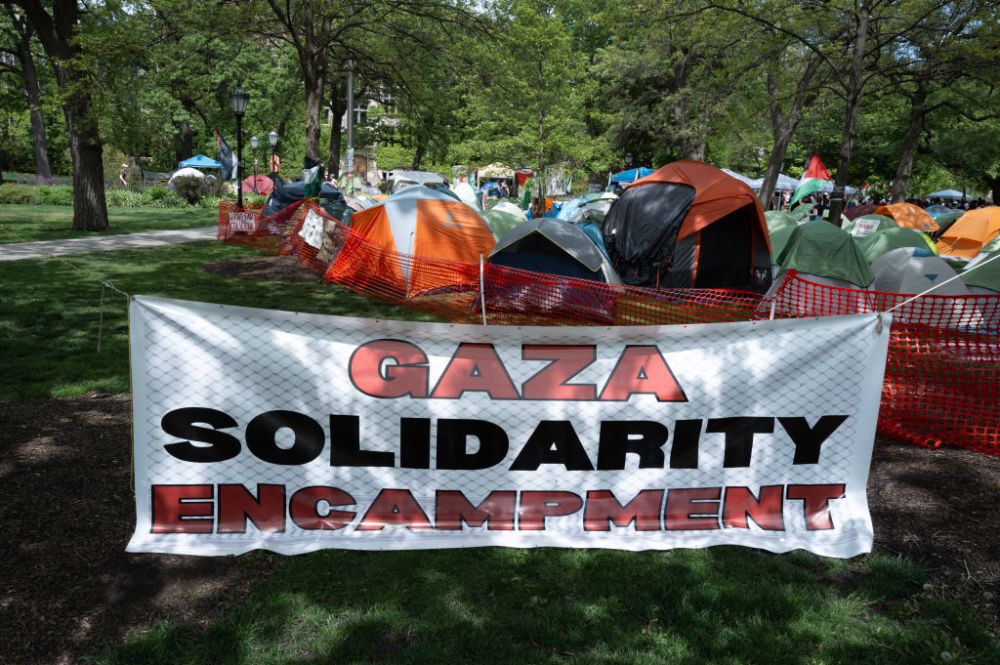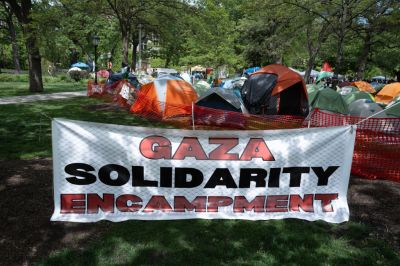Hello and happy Sunday. I wasn’t around for the late 1960s, but I’ve seen plenty of movies about that era. And so for much of the past couple of weeks, the lyrics to Buffalo Springfield’s “For What It's Worth” have been on repeat in my head. (Sing along with me now: “There’s something happening here/What it is ain’t exactly clear.”) I can’t be the only one who thinks it feels a lot like 1968.
Anti-Israel protests have spread across the country since mid-April, when students set up a tent encampment at Columbia University. Columbia asked the NYPD to come in and break up the protest, a move that backfired spectacularly. A new tent encampment sprung up almost immediately, and similar protests started popping up on campuses elsewhere. In The Morning Dispatch on Friday, we published this helpful map showing campuses where, in total, more than 2,000 protesters—many of them outside agitators—have been arrested. Since then, 25 people were arrested at the University of Virginia.

On Tuesday, protesters at Columbia occupied Hamilton Hall (not a random choice: Protesters took over the same building during Vietnam War protests in 1968). At UCLA, where more than 200 people have been arrested, demonstrators blocked Jewish students from walking through campus. Pro-Israeli counterprotesters tried to dismantle the UCLA encampment Tuesday, clashing with protesters and shooting off fireworks.
There’s a lot to unpack about these protests above and beyond the conflict between Israel and Hamas that prompted them. Let’s start with what they say about the state of academia, particularly at elite schools like Columbia. In his Wednesday G-File (🔒), Jonah wrote about Johannah King-Slutzky, a Columbia graduate student who served as a spokeswoman for the protesters who occupied Hamilton Hall. She went viral for a press conference in which she demanded the university provide food to the group, prompting Jonah to write: “The notion that the school has a moral obligation to feed students illegally occupying a campus building is so cringey, so parodically perfect in its tidy summation of what’s wrong with these protesters and schools, I struggle to find the words.” But he managed to find some anyway, and made the point that the schools have no one to blame but themselves: These leftist activists are exactly the kind of students they sought out. He writes:
The elite education system is geared toward a very specific understanding of what “[insert fancy school name here] material” is and it leans very much to the left. … Creating cadres of elite investment bankers or successful knee surgeons isn’t why people go to work as education bureaucrats. Instead, creating cadres of educated activists, journalists, and academics committed to social justice is why they’re there.”
While the idea that the protests might in any way influence the war between Israel and Hamas seems farcical, the chance they could influence the presidential election here in the United States is real. As Nick asks in Boiling Frogs (🔒), “Are these histrionic imbeciles actually going to end up tipping the election to Trump?” We have written before that Joe Biden needs the support of young voters (and he really can’t afford to lose Michigan, which has a large Arab American population), but that’s not what Nick focuses on. “What worries me about the campus protests isn’t that they’re persuading young voters or Democrats writ large to boycott Biden,” he writes. “It’s that they’re giving otherwise Trump-skeptical centrists a reason to hold their noses and support you-know-who. … Voters might not care much about Israel and Palestine but they do care about civic disorder.”
Nick wrote that on Tuesday, and in that newsletter he called attention to an article Jonathan Chait wrote for New York magazine in which he wondered whether we might see an alignment of pro-Hamas activists and Trump supporters. In Friday’s Boiling Frogs (🔒), Nick shares a video from the University of Alabama, where protesters and counterprotesters found solidarity for a brief moment, coming together to shout the, um, profane version of “Let’s Go Brandon.”
As the week wore on, administrators sought to clear the encampments—with mixed success. NYU brought in the NYPD, and classes will resume at UCLA on Monday. How long other protests continue remains to be seen: Many colleges are in finals right now and students should be getting ready to head home. What if they don’t?
Coming back to Buffalo Springfield, it’s worth noting that the iconic song that appeared in Forrest Gump—and has been covered by acts ranging from Ozzy Osbourne to Lucinda Williams—was not actually a Vietnam War protest song, but a response to the Los Angeles riots in 1966. The band broke up in 1968, but two of its members, Stephen Stills and Neil Young, later gave us a much more somber protest song. In 1970, Crosby, Stills, Nash & Young recorded “Ohio” in response to the shootings that killed four Kent State University students amid protests—and the anniversary of that tragedy was yesterday. Let’s hope history stops repeating itself before it’s too late.
Thanks for reading.
David Drucker and John have a deeply reported piece on the maneuverings that resulted in legislation requiring Chinese-owned ByteDance to divest from TikTok to keep the popular app from being banned. The bill was voted out of committee on March 7 and signed into law by President Biden on April 24, but that quick process belies the years of negotiation that led up to it. Drucker and John talked to Democratic Rep. Raja Krishnamoorthi, who co-sponsored the legislation with recently resigned GOP Rep. Mike Gallagher, and learned that talks took a year. They detail how lawmakers kept the negotiations quiet, which allowed them to catch TikTok off-guard, and how TikTok’s rushed response—which included asking users to call their representatives—backfired. They also get into Donald Trump’s flip-flop on TikTok (as president he tried to ban it by executive order but was stopped by the courts; now he opposes it on the grounds that a ban would help Facebook) and look at the reasons Trump might have been quiet about the bill. And then there’s the inevitable question as to whether it will affect the election, given that the app is popular among young people that Biden can’t afford to lose. “What if any political fallout might there be?” Drucker and John ask. “Democrats are skeptical it will have any impact in November because the bill was changed between initial passage in March and April to extend the divestment timeframe from six to up to 12 months. That would push the divest-or-ban deadline well past Election Day, even if likely court challenges fail to delay enforcement of the law.”
Secretary of State Antony Blinken traveled to Israel this week to promote U.S. efforts to facilitate a ceasefire between Israel and Hamas. Charlotte reports on his visit and the state of negotiations. Under the U.S.-backed proposal, Hamas would release hostages in phases, with each exchange kicking off a 40- or 42-day pause in the fighting. The proposal includes no commitment to end the war, however, which Charlotte notes is “a key demand of Hamas and a non-starter for Israel.” And if the deal falls through, expect Israel to launch an offensive in Rafah. “Israel has also begun preparations to evacuate and provide shelter, food, and other humanitarian services to the city’s more than a million civilians,” Charlotte writes, “most of them displaced by fighting elsewhere in the Strip. Israeli officials reportedly assessed that the movement of Gazans … will take between two and three weeks, after which the IDF ground forces can begin clearing Rafah of its thousands of Hamas fighters neighborhood by neighborhood.”
And here’s the best of the rest:
- It’s been almost a year since the Supreme Court ruled that race-based admission policies at the collegiate level violated the Constitution. What about competitive high schools, though? Alison Somin of the Pacific Legal Foundation writes that the court recently declined to hear a case that would have addressed the issue but notes that there are other cases working their way through the system.
- Sometimes, you just have to laugh. So Michael Warren and Sarah take a much-deserved break from reporting on the minutiae of Donald Trump’s trial in Manhattan in The Collision to check in on what late-night comedians think of the proceedings as a proxy for how the deliberations are breaking through to voters.
- Six months out from the presidential election, polling shows that the race is pretty much a dead heat. To sort out where things stand, Chris Stirewalt looks at some other numbers: satisfaction with the state of things, party identification, and voter enthusiasm. There, he finds some signs favoring Donald Trump.
- In Wanderland (🔒), Kevin (sort of) praises Speaker Mike Johnson for calling Marjorie Taylor Greene and other House of Representatives disruptors’ bluff. How did Johnson do it? He learned that you don’t negotiate with terrorists.
- If you’re feeling a little down about the state of things, check out this piece we published today from Scott Salvato about growing up in a Catholic-Jewish neighborhood on Long Island.
- In Dispatch Politics, David Drucker, Michael, and Charles report that a recent Federal Election Commission decision could “radically reshape campaign politics.” The FEC ruled that campaigns and supporting super PACs, long banned from working together directly, can now coordinate on door-to-door voter turnout efforts.
- On the pods: On Advisory Opinions, Sarah and David French discuss two big Supreme Court arguments: Trump’s immunity case and the suit over Idaho’s abortion ban. Do the campus protests resemble 1968, as I discussed above? What about January 6? Or the Occupy Wall Street Movement? Sarah, Jonah, and Steve ponder the question on The Dispatch Podcast. On The Remnant, Jonah welcomes Robert Kagan to discuss his new book, Rebellion, and debates him over whether Donald Trump represents the logical evolution of the American right.







Please note that we at The Dispatch hold ourselves, our work, and our commenters to a higher standard than other places on the internet. We welcome comments that foster genuine debate or discussion—including comments critical of us or our work—but responses that include ad hominem attacks on fellow Dispatch members or are intended to stoke fear and anger may be moderated.
With your membership, you only have the ability to comment on The Morning Dispatch articles. Consider upgrading to join the conversation everywhere.